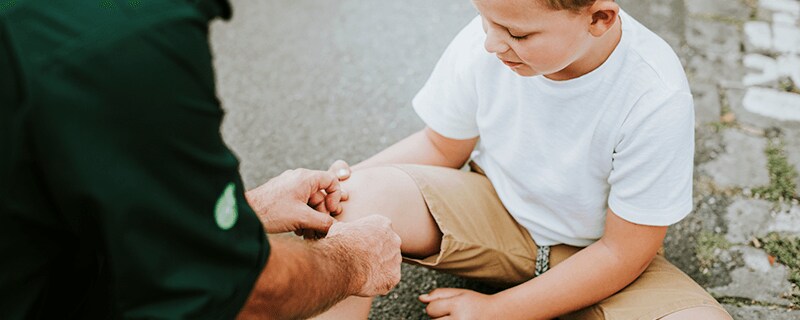5 Mistakes to Avoid when Treating Burns
Even everyday household chores can cause accidental burns. Though millions of burn injuries occur each year in the United States, the majority are minor and require minimal, if any, formal medical treatment. If you’re dealing with a minor burn, here are a few “don’ts” to remember.
1. Don’t fight heat with cold.
Contrary to popular belief, the science behind fighting heat with cold is unfounded and can be dangerous. Ice and cold water can increase pain and burn depth. Use mild, cool or room-temperature water to release the heat from the skin. Be sure to gently cleanse the area with soap, water and a thorough rinse.
2. Don’t pop blisters.
Tempting as it may be, fight the urge! Popped blisters create an opening for germs to set up camp, multiply and create infection. Signs and symptoms of infection include fever, oozing or pus, swollen lymph nodes (gland-like tissue), a red streak from the burn, increased pain, swelling or redness. Don’t ignore the signs! Seek follow-up medical attention if symptoms of infection occur post-burn.
3. Don’t apply everything but the kitchen sink.
First myth on the chopping block: egg whites. Egg whites can be quite dangerous if applied to a burn as uncooked eggs are prime conditions for bacteria to thrive. In addition to the bacterial incubator effect, allergies to egg are quite common and can cause immediate, sometimes severe, allergic reactions when applied to broken skin.
Next up, buttering burns. Save it for the dinner rolls as butter can slow the release of heat from the skin, causing a deeper burn. While in the fridge, go ahead and bypass the rest of the sandwich ingredients, including mustard and mayonnaise, which are also common myths.
Additionally, there’s the minty fresh myth. Though it may feel clean and cool to the mouth, toothpaste can increase risk of infection and some of the chemicals commonly contained in toothpaste could be potentially harmful or irritate the burn wound. In general, use of pastes, oils, creams and lotions should be avoided due to risk of infection and irritation. Consult a healthcare practitioner for additional guidance.
Finally, if a bandage is used to cover the site, do not apply gauze or other covering with fibers as it will get stuck in the burn wound. Ouch!
4. Don’t seek an antibiotic unless needed.
Minor burns typically do not require antibiotics. If signs or symptoms of infection occur, seek follow up care. For mild to moderate pain or swelling, non-prescription acetaminophen or ibuprofen may be helpful.
5. Don’t forget to review tetanus vaccination status.
Burns carry compromised tissue that may be favorable to the growth of Clostridium tetani, a big bad bacteria that creates the byproduct responsible for Tetanus disease (commonly known as lockjaw). Although rare, Tetanus is a critical disease. It’s important to review vaccine history to verify the date of the last Tetanus vaccine. In the event of a burn or other injury causing a break in the skin, it’s recommended to receive a tetanus vaccine booster if the vaccine hasn’t been received within the last 5 years. Unvaccinated individuals that fall victim to a burn should seek immediate medical attention to review if additional preventive treatment is recommended.
Unvaccinated (Opens in a new tab or window) from tetanus, out of date on the 10-year booster, unsure or have questions? Be your own advocate and protect yourself. Ask a Pharmacist or Clinic Healthcare Practitioner.
More info about burn care:
Burn classifications include heat, electrical discharge, friction, chemicals and radiation. Different burns require different treatment. For example, electrical and chemical burns may cause injury that is not apparent on the skin. If you have suffered an electrical or chemical burn, seek immediate medical attention.
For mild burn treatment, contact your primary healthcare practitioner for evaluation and treatment.
For moderate to severe burn injuries that include the face, hands, feet or genitalia, or burns covering a large area, call 9-1-1 and/or report to the closest emergency department immediately. If a burn occurs on an infant or elderly individual, consider the burn severe regardless of size.
Explore more healthy living advice from our team of experts.
Disclaimer: This information is educational only and not providing healthcare recommendations. Please see a healthcare provider.

